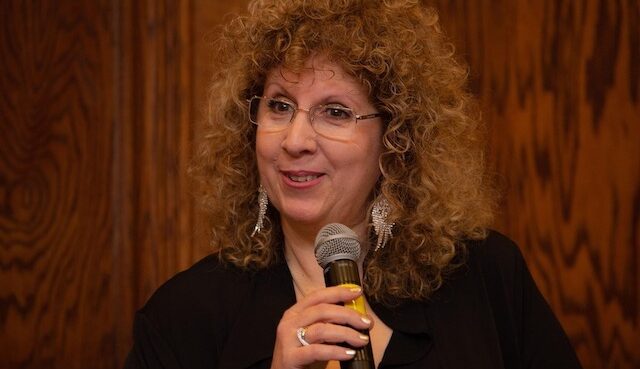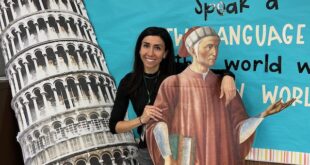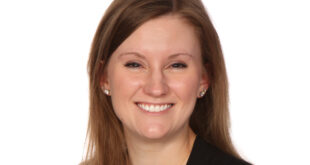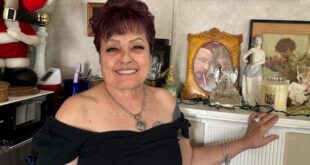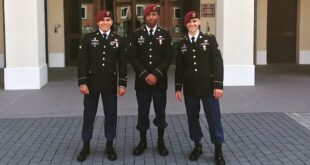A clinical scientist at the National Institutes of Health since 1996 and a program director since 2007, Dr. Lynn Sorbara is helping make early cancer detection a reality.
Imagine going to the doctor for your annual checkup, providing a small sample of blood or saliva for testing, and learning a few days later whether you’re in the clear or dealing with the early stages of cancer.
Identifying the dread disease that early would increase your chances of survival, as well as minimize your pain and the disruption to your family. More people would be spared the terror of suddenly learning they have stage 4 cancer, with only months to live.
Such a test, referred to as a liquid biopsy, is the goal of clinical scientist Lynn Sorbara, who has spent years of her distinguished career at the National Institutes of Health working on its development.
Sorbara chose to go into medical research when doctors were unable to diagnose her father, whose family was from Calabria, as she, her Sicilian-born mother and her younger brother watched on anxiously.
She earned her Ph.D. in molecular pharmacology and has advanced through the echelons of medical research science ever since. She became a clinical staff scientist at the National Institutes of Health in 1996 and a program director in 2007.
However, she still makes time to delight in Italian culture. She’s second vice president of the Abruzzo and Molise Heritage Society in the D.C. area, where she lives. She’s also writing a pair of books about her family’s Italian roots and traditions.
Fra Noi: You have said your father’s death at a young age had a great impact on you and inspired you to go into medical research. What happened?
Sorbara: I think even before my father’s death, I was the kind of kid that was curious and fascinated with how things work. My father was sick a lot. In December 1969, he came down with strep throat. By March, he was in excruciating pain. He died of streptococcal meningitis.
As I was growing up, I thought, “Why didn’t anybody know what this was?” We lived in New York City at the time; it was 1970, and I was 14. My brother was 8.
As it turns out, my brother and I have celiac disease. I was hospitalized 14 times in my life for fevers above 105. No one could figure it out. I went to the best immunologist here in D.C., and they figured out I was a celiac, so probably my father was, too. It gave me this fire in my heart to find out what was wrong. I didn’t want others to have to suffer like we did. So I decided to dedicate my life to research.
Fra Noi: What did you do next?
Sorbara: My mother only had a part-time job, and it became clear we were living near the poverty line, so I got a job in a department store. In my senior year, I wanted to go to college to study biology and chemistry. My mom said, “You have to get a full-time job.” One of my high school teachers found out CUNY was basically free for people with our income.
I got a job for six hours a day with a company owned by Aristotle Onassis. There was a time when I even worked directly for (him). So I was able to go to college for free, and still work and help support the family.
Fra Noi: Were there any serendipitous moments when you thought, “This is what I’m meant to be doing”?
Sorbara: Research is really a lot of disappointments. But there’s always a couple of wonderful things that happen, and it kind of pushes you along.
My Ph.D. thesis was on a drug called Taxol. We had no idea what this drug was.
We knew from early experiments that it was powerful and could be used for cancer. It turned out to be one of the most widely used drugs in the world. It’s still used today for lung, breast and sometimes testicular cancer, though immunotherapies are becoming more popular because they have less side effects.
So that was a big reason for me to keep on going. The difference in my mind between a physician who’s treating one person at a time, and a researcher — I always felt that doing research would be a contribution to hundreds of thousands of people in the world. What physicians do is important, but I felt my calling was to contribute to research.
Fra Noi: After graduation, you worked in diabetes research at Rockefeller University, then Mount Sinai, then the National Institutes of Health. But what you really wanted to do was work on cancer research. Why?
Sorbara: I think I felt cancer was the bigger problem. There were very few people surviving cancer at the time. You’d hear the word cancer, and everyone would think it’s a death sentence.
At the National Cancer Institute, I was hired when pathology was starting to look at genetics, genetics sequencing and DNA to make a diagnosis. This was in its infancy.
For me, it was very rewarding because we were learning something new about how to help patients every day. A lot of NIH patients were children under 12 with sarcomas. It was difficult to see those kids suffering, so if our lab could make a correct diagnosis, we were helping them.
Fra Noi: You changed jobs within the NIH in 2007. Tell us about that.
Sorbara: I became a program director who oversees grants, not in a financial but in a scientific way.
When I was working in the lab, liquid biopsy tests were in their infancy. When I became a program director, I realized there was a lack of funding for liquid biopsy work, and they didn’t have a way to use liquid biopsy for early detection.
My supervisor and I wrote a program and went up the chain in the NIH and NCI [National Cancer Institute]. We received millions of dollars to support research on early detection using liquid biopsy.
It has now become a really big thing because there are two companies, Grail and Guardant, and both are trying to get approval for their liquid biopsy technology for early detection.
Fra Noi: You and your supervisor wrote a commentary that called liquid biopsy the “holy grail,” and CNN reported on that and used your phrase. Why is it the holy grail?
Sorbara: It will change the way medical decision-making with cancer is done.
I’m a speck in an ocean of people who are doing this research, and if I live long enough to see this done, it will be a massive achievement. I would be elated.
It’s such an important advance. There are very few things that completely change the way medicine is done. Penicillin was one of those things. The polio vaccine is one of those things. This will be one of these things.
The following disclaimer is provided by Sorbara’s employer: This material should not be interpreted as representing the viewpoint of the U.S. Department of Health and Human Services, the National Institutes of Health or the National Cancer Institute.
The above appears in the January 2022 issue of the print version of Fra Noi. Our gorgeous, monthly magazine contains a veritable feast of news and views, profiles and features, entertainment and culture. To subscribe, click here.
 Fra Noi Embrace Your Inner Italian
Fra Noi Embrace Your Inner Italian


